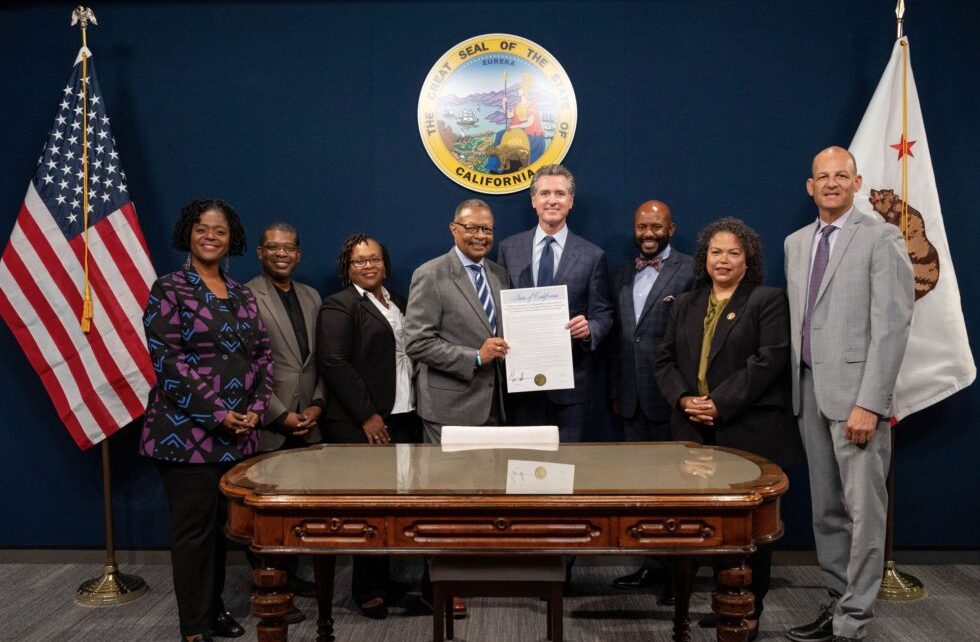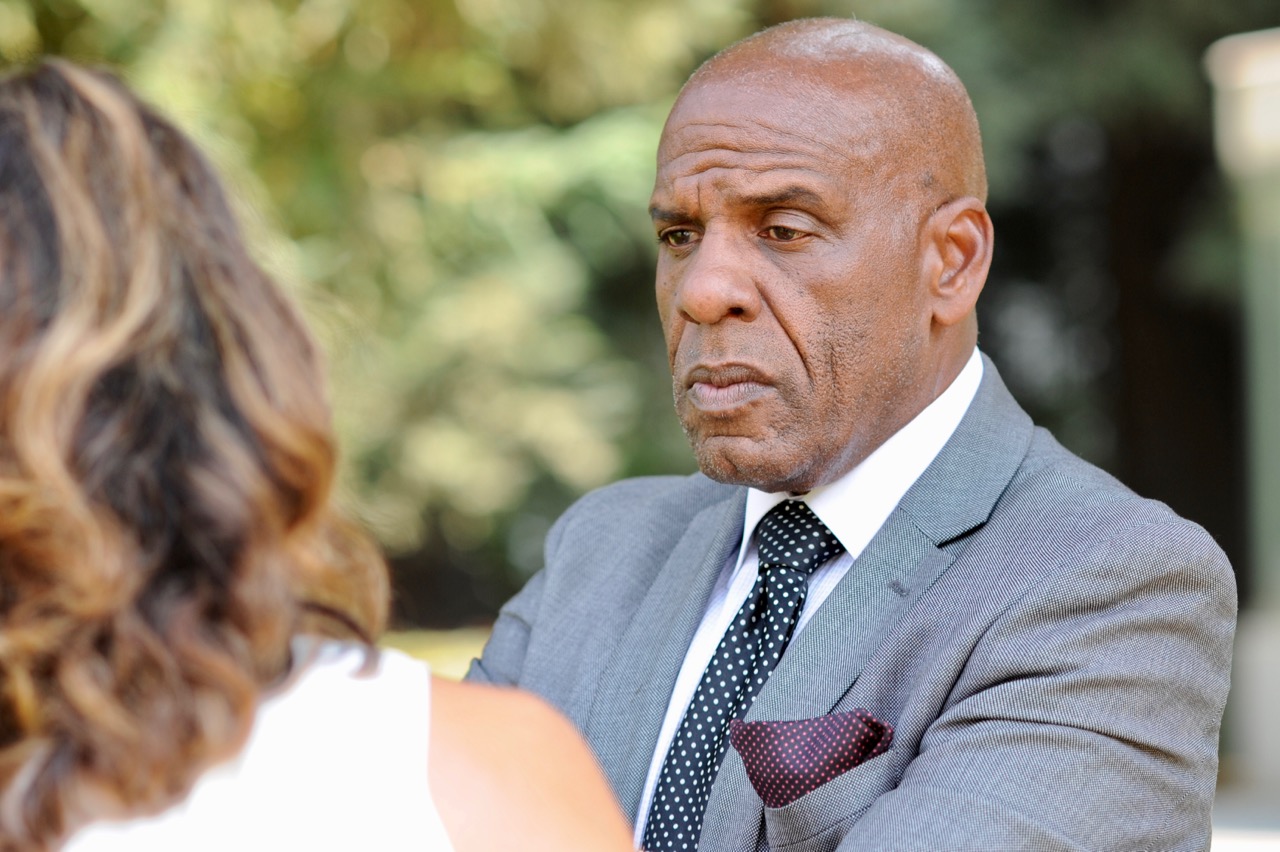
Governor Newsom signs AB 3089 into law (Photo: gov.ca.gov)
Newsom Signs Controversial Slavery Apology Bill Into Law
AB 3089 becomes one of the few reparations bills to be signed this session
By Evan Symon, September 27, 2024 1:00 pm
A bill that would issue a formal apology by the state for human rights violations and crimes against humanity on African slaves and their descendants was signed into law by Governor Gavin Newsom on Thursday, becoming one of the few reparations related bills to become law this session.
Assembly Bill 3089, authored by Assemblyman Reggie Jones-Sawyer (D-Los Angeles), will have the State of California recognize and accept responsibility for all of the harms and atrocities committed by the state, and entities under its jurisdiction who promoted, facilitated, enforced, and permitted the institution of chattel slavery and the enduring legacy of ongoing incidents from which the systemic structures of discrimination have come to exist. In addition, AB 3089 will further provide that the State of California apologize for perpetuating the harms African Americans have faced and affirms its role in protecting the descendants of enslaved people and all Black Californians. The bill also requires a plaque memorializing this apology to be publicly and conspicuously installed and maintained in the State Capitol Building.
Assemblyman Jones-Sawyer authored the bill as one of fourteen reparations related bills earlier this year. As giving out direct cash payments isn’t an option because of a severe lack of popularity in the Legislature, in the Governor’s office, and amongst residents for them, legislators working on creating bills based on the recommendations of the California Reparations Task Force had to find non-monetary options. Also pressing is the state’s $73 billion deficit, leaving little room for anything costing too much. AB 3089, consisting of a simple apology and a plaque to be placed in the Capitol, proved to be one of the most benign and least expensive options for legislators.
While AB 3089 had steady opposition throughout the year, it nonetheless passed the Senate floor vote 32-0 with 8 abstentions and passed the Assembly vote 72-0 with 7 abstentions late last month. While many opponents had hoped for a veto, they noted that this bill is much more benign than some of the more extreme measures and reparations proposals made in the last few years, including a massive $800 billion reparations estimate by the Reparations Task Force last year that was literally laughed off as a suggestion by the public and lawmakers.
As AB 3089 moved up to the Governor’s desk, many of the 14 reparations bills began dropping off one by one. This included two bills authored by Bradford that were held back in the Senate in May due to their costly nature. One, SB 1013, would have given major financial property tax assistance solely for black descendants of slaves. The other, SB 1007, would have given housing grants for the same group in formerly redlined areas. Others failed to make it past the Assembly and House votes in August because of high-cost issues. This included Senate Bill 1403, which would have created the California American Freedman Affairs Agency to assist Californians with reparations program, and, Senate Bill 1331. Finally, Newsom also vetoed some that made it to his desk, such as SB 1050, the eminent domain reparations bill.
By Thursday, only a handful remained. With these bills being of little to no cost to the state, and less controversial than those removed or vetoed earlier this year, they were signed into law by Governor Newsom on Thursday. The signed bills ultimately included ones like AB 1815 (Assemblywoman Akilah Weber (D-San Diego), which clarifies that “race” includes traits associated with race, such as hair texture and protective hairstyles, and SB 1089 (Senator Lola Smallwood-Cuevas (D-Los Angeles), which requires grocery stores and pharmacies to provide advance notice to the community and workers before closures to help address food deserts. However, the banner bill signed by Newsom was AB 3089.
California continues to confront the state’s past role in facilitating and enforcing slavery — and the discrimination that continued against Black Californians after slavery was abolished.
Today, we take another step forward, making amends for these grave injustices of the past. pic.twitter.com/5tJZsQfzOE
— California Governor (@CAgovernor) September 26, 2024
“As we confront the lasting legacy of slavery, I’m profoundly grateful for the efforts put forward by Chair Wilson and the members of the California Legislative Black Caucus,” said Newsom on Thursday in a statement. “The State of California accepts responsibility for the role we played in promoting, facilitating, and permitting the institution of slavery, as well as its enduring legacy of persistent racial disparities. Building on decades of work, California is now taking another important step forward in recognizing the grave injustices of the past – and making amends for the harms caused.”
Assemblywoman and Black Caucus Chairwoman Lori Wilson (D-Suisun City) added that “As Chair of the California Legislative Black Caucus, I am deeply grateful to Governor Newsom for signing this critical set of Reparations Bills, which have been key priorities for our Caucus. These bills lay a meaningful foundation to address the historic injustices faced by Black Californians, and I want to extend my sincere thanks to my fellow Caucus members and the advocacy leaders who have championed this effort. This is a multi-year effort, and I look forward to continuing our partnership with the Governor on this important work in the years to come as we push toward lasting justice and equity.”
However, others noted on Thursday and Friday that reparations attempts ultimately failed this year, as all attempts to give any sort of funding for reparations or create large programs fell by the wayside.
“This apology bill was the biggest one they could get done,” explained Legal adviser Richard Weaver to the Globe on Friday. “And all it is is words. And I hope the plaque addresses the fact that, while slavery was in California, that was quickly rectified when California became a state in 1848 and entered the union as a free state. They make a big deal that 2,000 slaves had been brought here in the 1850s, but they were instantly freed when they got to California. Californians of all races joined the Civil War to help end the practice. But I get the feeling that the plaque won’t mention that.
“Anyway, if this was the biggest they could get done, it does not bode well for the future. They didn’t even bring create a bureau for reparations this year, which is the first real step. They know that, as soon as money starts touching it, legal challenges will come spilling out. The reparations task force estimated, what, $800 billion to be paid out? There is no way that is happening. The apology and plaque. That’s as far as they got this year. And with state finances still very rocky and tens of billions off the budget, next session will probably be even less successful.”
The six reparations bills signed on Thursday were the last such bills for the session.
- Bill to Require Law Enforcement Disclosure if AI Was Used To Help Write Reports - August 7, 2025
- Gov. Newsom Files FOIA Request To ‘Expose True Cost’ Of L.A. Federal Troop Deployment for Anti-ICE Riots - August 6, 2025
- California Redistricting: How Newsom’s Plan Will Demolish Hard Fought GOP Gains - August 6, 2025




Look at Gavin “Hair-gel Hitler Newsom” smiling like the WEF globalist stooge that he is in the photo above?
It’s ironic that the Black Democrats surrounding him are gloating over an apology for slavery when California was never a slave state and it was Democrats who instituted slavery, segregation, Jim Crow laws and the KKK?
Maybe legislative Democrats should apologize and pay for the sins of their Democrat predecessors?
As for Democrat Assemblyman Reggie Jones-Sawyer who authored the bill, it curious how he as an African-American, got elected in the 57th State Assembly district when it is overwhelming Latino/Hispanic at almost 70%? Maybe he was he installed with Democrat voter fraud and rigged voting machines? No doubt the few to none of his constituents wanted this slavery apology bill?
(https://en.wikipedia.org/wiki/California%27s_57th_State_Assembly_district)
Yes, it IS ironic, TJ. It’s also another ridiculously irrelevant and symbolic time-waster.
Thank goodness Dem assemblyman trouble-maker extraordinaire Reggie Jones-Sawyer is termed out this year. He tried running for an L.A. City Council seat, as these forever-politician-types tend to do, because they can’t do anything else, but he didn’t make the run-off. I suppose he will now be appointed by the governor to some worthless state commission, where he can make a nice six-figure salary for showing up for meetings with other washed-up politicians two or three times a year.
California, led by the democrats, has become a hyper racist state
It was the republican party led by lincoln that ended slavery in the usa, and it was ended by the blood and grief of white americans
This is the democrats doing there best to reestablish their slave based plantation with tax payer sentiment and money
Governor Gruesome, you dont speak for me, and neither does the hyper racist democrat controlled california legislature
– a lifelong californian
In related news:
California also apologizes for the Rape of Nanking, the sneak attack on Pearl Harbor, and for murdering the Lindbergh Baby.
But he won’t apologize for wrecking the state of California.
Just two years ago, these same Democrats were calling Larry Elder an “Uncle Tom”. If these Democrats were so concerned about African Americans, why are they flooding the state with illegal immigrants to take their jobs, banning school choice, and running the businesses they work for, or even created, out of the state? Democrats don’t care about the well being of African Americans. Democrats always have, and will continue to be disgusting racists who keep people with black skin down.
Here is what the plaque should read, “The Democrat Party accepts responsibility for the role we played in promoting, facilitating, and permitting the institution of slavery, as well as its enduring legacy of persistent racial disparities.”
Ultimately, this is a completely empty and vapid gesture that means absolutely nothing. The vast majority of people in the state don’t know what bills are passed in a given year and the existence of this one won’t be known by anyone beyond those who actually pay attention. And even then, it will be quickly forgotten as more important matters need to be dealt with.